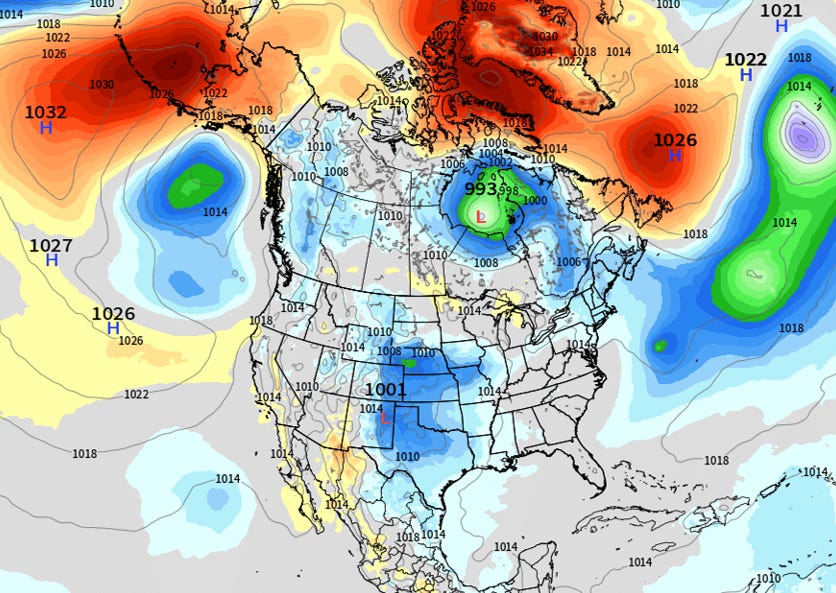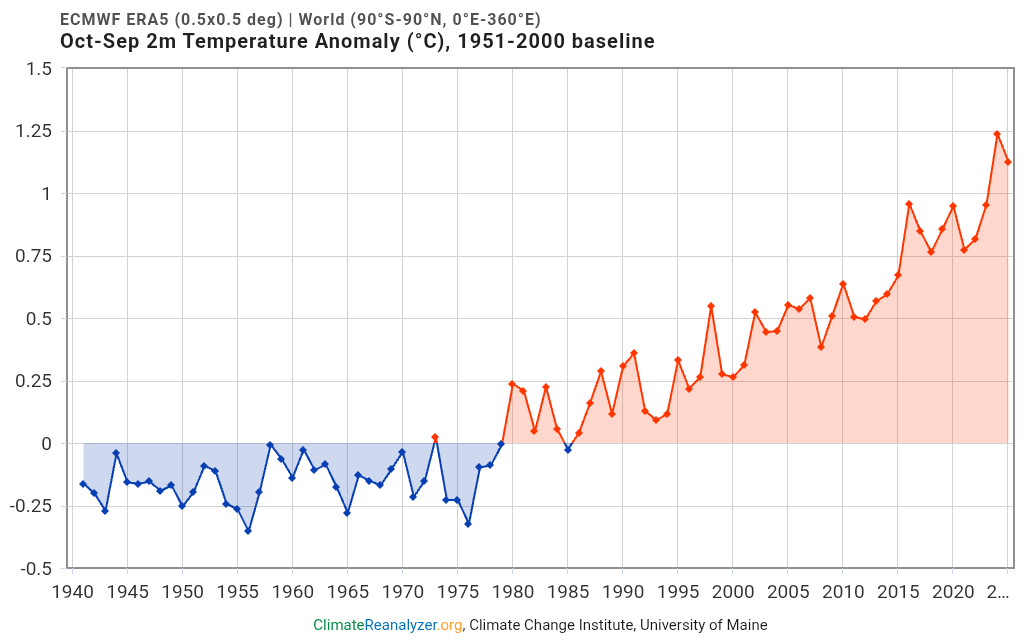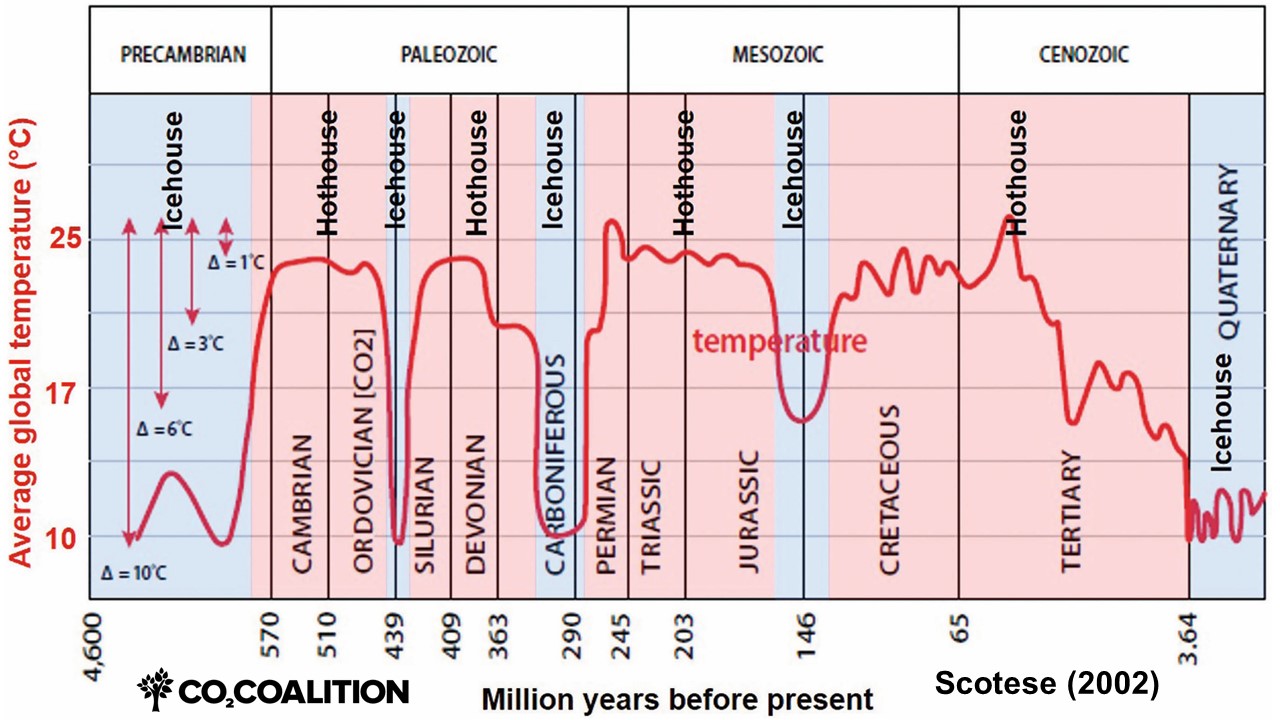Never heard of this guy before. But damn this guy doesn't mince words. He does however make a valid point. If global warming estimates were true no bank would lend money to someone building or buying a beachfront condo in low lying places like Florida or the Carolinas.
The greatest hoax perpetrated on mankind
- Thread starter K Douglas
- Start date
Would this not be contingent of what the insurance companies are paying out for claims?Never heard of this guy before. But damn this guy doesn't mince words. He does however make a valid point. If global warming estimates were true no bank would lend money to someone building or buying a beachfront condo in low lying places like Florida or the Carolinas.
If assets are still 'insurable" than there is really no issue. Once insurance companies start saying "No", things might change.
I keep hearing about insurance companies leaving Florida, wonder if it's happening elsewhere, we just don't hear about it.
Yeah a Trump supporting nutter, who yells "shut up and sit down", knows more about climate change than the scores of actual qualified scientists, alright.
And banks won't lend money for beach front property if there was climate change risk? Lol.
They are greedy bastards who will lend money if they think they can make a quick buck.
Haven't you heard of the sub-prime crisis in 2008?
And banks won't lend money for beach front property if there was climate change risk? Lol.
They are greedy bastards who will lend money if they think they can make a quick buck.
Haven't you heard of the sub-prime crisis in 2008?
Yeah a Trump supporting nutter, who yells "shut up and sit down", knows more about climate change than the scores of actual qualified scientists, alright.
And banks won't lend money for beach front property if there was climate change risk? Lol.
They are greedy bastards who will lend money if they think they can make a quick buck.
Haven't you heard of the sub-prime crisis in 2008?
These are very good points. The anti-climate change folks want us all to believe it is some massive hoax. As OpXXX has pointed out, many property insurers are starting to cancel policies or stop issuing them in places like Florida (which would be one of the hardest hit states when/if sea levels rise) as well as places close to things like heavy wooded area where wild fires are likely to happen. If you cannot insure your house, the bank is going to pull your mortgage. Its as simple as that. So, this dudes point in the video will become reality soon, unless something is done. Which, I suspect it will (like government intervention).Would this not be contingent of what the insurance companies are paying out for claims?
If assets are still 'insurable" than there is really no issue. Once insurance companies start saying "No", things might change.
I keep hearing about insurance companies leaving Florida, wonder if it's happening elsewhere, we just don't hear about it.
I know that Ron DeSantos was under fire recently for not working to improve insurance in the state of Florida, while he was jerking off over the Alligator Alcatraz bullshit. There is certainly a crisis in that state, and I haven't heard much about how they are working to fix it.
Also, this dude is a goof. He is old and rich and will likely not be around when the worst of climate change hits. And, as we have seen (and data has backed this up), we're seeing more and more severe storms and what not.
Its always this.Never heard of this guy before. But damn this guy doesn't mince words. He does however make a valid point. If global warming estimates were true no bank would lend money to someone building or buying a beachfront condo in low lying places like Florida or the Carolinas.
Only now its also denying the rising global temperature, massive storm damage, forest fires and insurance companies leaving risky areas.

Already insurance companies won't cover 10% of american's homes.
Would this not be contingent of what the insurance companies are paying out for claims?
If assets are still 'insurable" than there is really no issue. Once insurance companies start saying "No", things might change.
I keep hearing about insurance companies leaving Florida, wonder if it's happening elsewhere, we just don't hear about it.
no you keep hearing about insurance companies raising premiums because of climate change propaganda , however they still underwrite policies
What the IPCC Actually Says About Extreme Weather
I promise, you'll be utterly shocked
Roger Pielke Jr.
Jul 19, 2023

What the IPCC Actually Says About Extreme Weather
I promise, you'll be utterly shocked
Back to extreme weather — let’s take a look what IPCC AR6 says about the time of emergence for various extreme events. Here are some direct quotes related to specific phenomena:
- An increase in heat extremes has emerged or will emerge in the coming three decades in most land regions (high confidence)
- There is low confidence in the emergence of heavy precipitation and pluvial and river flood frequency in observations, despite trends that have been found in a few regions
- There is low confidence in the emergence of drought frequency in observations, for any type of drought, in all regions.
- Observed mean surface wind speed trends are present in many areas, but the emergence of these trends from the interannual natural variability and their attribution to human-induced climate change remains of low confidence due to various factors such as changes in the type and exposure of recording instruments, and their relation to climate change is not established. . . The same limitation also holds for wind extremes (severe storms, tropical cyclones, sand and dust storms).
The IPCC has concluded that a signal of climate change has not yet emerged beyond natural variability for the following phenomena:
- River floods
- Heavy precipitation and pluvial floods
- Landslides
- Drought (all types)
- Severe wind storms
- Tropical cyclones
- Sand and dust storms
- Heavy snowfall and ice storms
- Hail
- Snow avalanche
- Coastal flooding
- Marine heat waves
Those are cherry picked quotes, larue. That is not what the reports says.no you keep hearing about insurance companies raising premiums because of climate change propaganda , however they still underwrite policies
What the IPCC Actually Says About Extreme Weather
I promise, you'll be utterly shocked
Roger Pielke Jr.
Jul 19, 2023

What the IPCC Actually Says About Extreme Weather
I promise, you'll be utterly shockedrogerpielkejr.substack.com
Back to extreme weather — let’s take a look what IPCC AR6 says about the time of emergence for various extreme events. Here are some direct quotes related to specific phenomena:
- An increase in heat extremes has emerged or will emerge in the coming three decades in most land regions (high confidence)
- There is low confidence in the emergence of heavy precipitation and pluvial and river flood frequency in observations, despite trends that have been found in a few regions
- There is low confidence in the emergence of drought frequency in observations, for any type of drought, in all regions.
- Observed mean surface wind speed trends are present in many areas, but the emergence of these trends from the interannual natural variability and their attribution to human-induced climate change remains of low confidence due to various factors such as changes in the type and exposure of recording instruments, and their relation to climate change is not established. . . The same limitation also holds for wind extremes (severe storms, tropical cyclones, sand and dust storms).
The IPCC has concluded that a signal of climate change has not yet emerged beyond natural variability for the following phenomena:
Furthermore, the emergence of a climate change signal is not expected under the extreme RCP8.5 scenario by 2100 for any of these phenomena, except heavy precipitation and pluvial floods and that with only medium confidence. Since we know that RCP8.5 is extreme and implausible, that means that there would even less confidence in emergence under a more plausible upper bound, like RCP4.5
- River floods
- Heavy precipitation and pluvial floods
- Landslides
- Drought (all types)
- Severe wind storms
- Tropical cyclones
- Sand and dust storms
- Heavy snowfall and ice storms
- Hail
- Snow avalanche
- Coastal flooding
- Marine heat waves
Read it and find those quotes.
Loading…
www.ipcc.ch
Every region of the world will experience concurrent changes in multiple CIDs by mid-century (high confidence), challenging the resilience and adaptation capacity of the region.
1 Human activities, principally through emissions of greenhouse gases, have unequivocally caused global warming, with global surface temperature reaching 1.1°C above 1850-1900 in 2011-2020. Global greenhouse gas emissions have continued to increase, with unequal historical and ongoing contributions arising from unsustainable energy use, land use and land-use change, lifestyles and patterns of consumption and production across regions, between and within countries, and among individuals (high confidence). {2.1, Figure 2.1, Figure 2.2} A.1.1 Global surface temperature was 1.09 [0.95 to 1.20]°C5 higher in 2011–2020 than 1850–19006 , with larger increases over land (1.59 [1.34 to 1.83]°C) than over the ocean (0.88 [0.68 to 1.01]°C). Global surface temperature in the first two decades of the 21st century (2001–2020) was 0.99 [0.84 to 1.10]°C higher than 1850–1900. Global surface temperature has increased faster si
Follow the money. Believe the money.
Also believe the US DoD. They've put out plans detailing the security risks created by large scale migrations caused by climate changes.
Also believe the US DoD. They've put out plans detailing the security risks created by large scale migrations caused by climate changes.
SUMMARY
Modern doomsayers have been predicting climate and environmental disaster since the 1960s. They continue to do so today.
None of the apocalyptic predictions with due dates as of today have come true.
What follows is a collection of notably wild predictions from notable people in government and science.
More than merely spotlighting the failed predictions, this collection shows that the makers of failed apocalyptic predictions often are individuals holding respected positions in government and science.
While such predictions have been and continue to be enthusiastically reported by a media eager for sensational headlines, the failures are typically not revisited.
1967: ‘Dire famine by 1975.’


Source: Salt Lake Tribune, November 17, 1967
1969: ‘Everyone will disappear in a cloud of blue steam by 1989.’

Source: New York Times, August 10 1969
1970: Ice age by 2000

Source: Boston Globe, April 16, 1970
1970: ‘America subject to water rationing by 1974 and food rationing by 1980.’

Source: Redlands Daily Facts, October 6, 1970
1971: ‘New Ice Age Coming’

Source: Washington Post, July 9, 1971
1972: New ice age by 2070


Source: NOAA, October 2015
1974: ‘New Ice Age Coming Fast’

Source: The Guardian, January 29, 1974
1974: ‘Another Ice Age?’

Source: TIME, June 24, 1974
1974: Ozone Depletion a ‘Great Peril to Life’

But no such ‘great peril to life’ has been observed as the so-called ‘ozone hole’ remains:

Sources: Headline
NASA Data | Graph
1976: ‘The Cooling’

Source: New York Times Book Review, July 18, 1976
1980: ‘Acid Rain Kills Life in Lakes’

Noblesville Ledger (Noblesville, IN) April 9, 1980
But 10 years later, the US government program formed to study acid rain concluded:

Associated Press, September 6, 1990
1978: ‘No End in Sight’ to 30-Year Cooling Trend

Source: New York Times, January 5, 1978
But according to NASA satellite data there is a slight warming trend since 1979.

Source: DrRoySpencer.com
1988: James Hansen forecasts increase regional drought in 1990s

But the last really dry year in the Midwest was 1988, and recent years have been record wet.

Source: RealClimateScience.com
1988: Washington DC days over 90F to from 35 to 85

But the number of hot days in the DC area peaked in 1911, and have been declining ever since.

Source: RealClimateScience.com
1988: Maldives completely under water in 30 years

Source: Agence France Press, September 26, 1988
1989: Rising seas to ‘obliterate’ nations by 2000
The banks are like every capitalist. They don't give a fuck about climate change. It won't affect them short term. They want to make money for the next quarter.
What this guy says is a bunch of shit. Easily eaten up by idiots, especially MAGA's cult.
What this guy says is a bunch of shit. Easily eaten up by idiots, especially MAGA's cult.
1989: New York City’s West Side Highway underwater by 2019

Source: Salon.com, October 23, 2001
1995 to Present: Climate Model Failure

Source: CEI.org
2000: ‘Children won’t know what snow is.’


Source: The Independent, March 20, 2000
2002: Famine in 10 years

Source: The Guardian, December 23, 2002
2004: Britain to have Siberian climate by 2020

Source: The Guardian, February 21, 2004
2008: Arctic will be ice-free by 2018

Source: Associated Press, June 24, 2008
2008: Al Gore warns of ice-free Arctic by 2013

But… it’s still there:

Source: WattsUpWithThat.com, December 16, 2018
2009: Prince Charles says only 8 years to save the planet

Source: The Independent, July 9, 2009
2009: UK prime minister says 50 days to ‘save the planet from catastrophe’

Source: The Independent: October 20, 2009
2009: Arctic ice-free by 2014

Source: USA Today, December 14, 2009
2013: Arctic ice-free by 2015

Source: The Guardian, July 24, 2013
The paper: https://www.nature.com/articles/s41467-017-02550-9 (open access)
Gas hydrate dissociation off Svalbard induced by isostatic rebound rather than global warming
Abstract
Methane seepage from the upper continental slopes of Western Svalbard has previously been attributed to gas hydrate dissociation induced by anthropogenic warming of ambient bottom waters. Here we show that sediment cores drilled off Prins Karls Foreland contain freshwater from dissociating hydrates. However, our modeling indicates that the observed pore water freshening began around 8 ka BP when the rate of isostatic uplift outpaced eustatic sea-level rise. The resultant local shallowing and lowering of hydrostatic pressure forced gas hydrate dissociation and dissolved chloride depletions consistent with our geochemical analysis. Hence, we propose that hydrate dissociation was triggered by postglacial isostatic rebound rather than anthropogenic warming. Furthermore, we show that methane fluxes from dissociating hydrates were considerably smaller than present methane seepage rates implying that gas hydrates were not a major source of methane to the oceans, but rather acted as a dynamic seal, regulating methane release from deep geological reservoirs.
2013: Arctic ice-free by 2016

Source: The Guardian, December 9, 2013
2014: Only 500 days before ‘climate chaos’

But…

Sources: Washington Examiner

Source: Salon.com, October 23, 2001
1995 to Present: Climate Model Failure

Source: CEI.org
2000: ‘Children won’t know what snow is.’


Source: The Independent, March 20, 2000
2002: Famine in 10 years

Source: The Guardian, December 23, 2002
2004: Britain to have Siberian climate by 2020

Source: The Guardian, February 21, 2004
2008: Arctic will be ice-free by 2018

Source: Associated Press, June 24, 2008
2008: Al Gore warns of ice-free Arctic by 2013

But… it’s still there:

Source: WattsUpWithThat.com, December 16, 2018
2009: Prince Charles says only 8 years to save the planet

Source: The Independent, July 9, 2009
2009: UK prime minister says 50 days to ‘save the planet from catastrophe’

Source: The Independent: October 20, 2009
2009: Arctic ice-free by 2014

Source: USA Today, December 14, 2009
2013: Arctic ice-free by 2015

Source: The Guardian, July 24, 2013
The paper: https://www.nature.com/articles/s41467-017-02550-9 (open access)
Gas hydrate dissociation off Svalbard induced by isostatic rebound rather than global warming
Abstract
Methane seepage from the upper continental slopes of Western Svalbard has previously been attributed to gas hydrate dissociation induced by anthropogenic warming of ambient bottom waters. Here we show that sediment cores drilled off Prins Karls Foreland contain freshwater from dissociating hydrates. However, our modeling indicates that the observed pore water freshening began around 8 ka BP when the rate of isostatic uplift outpaced eustatic sea-level rise. The resultant local shallowing and lowering of hydrostatic pressure forced gas hydrate dissociation and dissolved chloride depletions consistent with our geochemical analysis. Hence, we propose that hydrate dissociation was triggered by postglacial isostatic rebound rather than anthropogenic warming. Furthermore, we show that methane fluxes from dissociating hydrates were considerably smaller than present methane seepage rates implying that gas hydrates were not a major source of methane to the oceans, but rather acted as a dynamic seal, regulating methane release from deep geological reservoirs.
2013: Arctic ice-free by 2016

Source: The Guardian, December 9, 2013
2014: Only 500 days before ‘climate chaos’

But…

Sources: Washington Examiner
The greatest hoax perpetrated on mankind is Trump.
Holy shit, anyone want to challenge any of the articles from the 1970s? lol1989: New York City’s West Side Highway underwater by 2019

Source: Salon.com, October 23, 2001
1995 to Present: Climate Model Failure

Source: CEI.org
2000: ‘Children won’t know what snow is.’


Source: The Independent, March 20, 2000
2002: Famine in 10 years

Source: The Guardian, December 23, 2002
2004: Britain to have Siberian climate by 2020

Source: The Guardian, February 21, 2004
2008: Arctic will be ice-free by 2018

Source: Associated Press, June 24, 2008
2008: Al Gore warns of ice-free Arctic by 2013

But… it’s still there:

Source: WattsUpWithThat.com, December 16, 2018
2009: Prince Charles says only 8 years to save the planet

Source: The Independent, July 9, 2009
2009: UK prime minister says 50 days to ‘save the planet from catastrophe’

Source: The Independent: October 20, 2009
2009: Arctic ice-free by 2014

Source: USA Today, December 14, 2009
2013: Arctic ice-free by 2015

Source: The Guardian, July 24, 2013
The paper: https://www.nature.com/articles/s41467-017-02550-9 (open access)
Gas hydrate dissociation off Svalbard induced by isostatic rebound rather than global warming
Abstract
Methane seepage from the upper continental slopes of Western Svalbard has previously been attributed to gas hydrate dissociation induced by anthropogenic warming of ambient bottom waters. Here we show that sediment cores drilled off Prins Karls Foreland contain freshwater from dissociating hydrates. However, our modeling indicates that the observed pore water freshening began around 8 ka BP when the rate of isostatic uplift outpaced eustatic sea-level rise. The resultant local shallowing and lowering of hydrostatic pressure forced gas hydrate dissociation and dissolved chloride depletions consistent with our geochemical analysis. Hence, we propose that hydrate dissociation was triggered by postglacial isostatic rebound rather than anthropogenic warming. Furthermore, we show that methane fluxes from dissociating hydrates were considerably smaller than present methane seepage rates implying that gas hydrates were not a major source of methane to the oceans, but rather acted as a dynamic seal, regulating methane release from deep geological reservoirs.
2013: Arctic ice-free by 2016

Source: The Guardian, December 9, 2013
2014: Only 500 days before ‘climate chaos’

But…

Sources: Washington Examiner
You really do pick the worst issues to defend.1989: New York City’s West Side Highway underwater by 2019

Source: Salon.com, October 23, 2001
1995 to Present: Climate Model Failure

Source: CEI.org
2000: ‘Children won’t know what snow is.’


Source: The Independent, March 20, 2000
2002: Famine in 10 years

Source: The Guardian, December 23, 2002
2004: Britain to have Siberian climate by 2020

Source: The Guardian, February 21, 2004
2008: Arctic will be ice-free by 2018

Source: Associated Press, June 24, 2008
2008: Al Gore warns of ice-free Arctic by 2013

But… it’s still there:

Source: WattsUpWithThat.com, December 16, 2018
2009: Prince Charles says only 8 years to save the planet

Source: The Independent, July 9, 2009
2009: UK prime minister says 50 days to ‘save the planet from catastrophe’

Source: The Independent: October 20, 2009
2009: Arctic ice-free by 2014

Source: USA Today, December 14, 2009
2013: Arctic ice-free by 2015

Source: The Guardian, July 24, 2013
The paper: https://www.nature.com/articles/s41467-017-02550-9 (open access)
Gas hydrate dissociation off Svalbard induced by isostatic rebound rather than global warming
Abstract
Methane seepage from the upper continental slopes of Western Svalbard has previously been attributed to gas hydrate dissociation induced by anthropogenic warming of ambient bottom waters. Here we show that sediment cores drilled off Prins Karls Foreland contain freshwater from dissociating hydrates. However, our modeling indicates that the observed pore water freshening began around 8 ka BP when the rate of isostatic uplift outpaced eustatic sea-level rise. The resultant local shallowing and lowering of hydrostatic pressure forced gas hydrate dissociation and dissolved chloride depletions consistent with our geochemical analysis. Hence, we propose that hydrate dissociation was triggered by postglacial isostatic rebound rather than anthropogenic warming. Furthermore, we show that methane fluxes from dissociating hydrates were considerably smaller than present methane seepage rates implying that gas hydrates were not a major source of methane to the oceans, but rather acted as a dynamic seal, regulating methane release from deep geological reservoirs.
2013: Arctic ice-free by 2016

Source: The Guardian, December 9, 2013
2014: Only 500 days before ‘climate chaos’

But…

Sources: Washington Examiner
The planet is warming and will hit 2ºC soon.
At 3ºC billions will begin to die off.

You need to keep your porn collection to yourself and to try to stay on topic.do you mean these guys?
The money is in oil$gas.
i don't listen to eco hypocrites like you who refuses to live a green lifestyle free of fossil fuel and their 100+ products like the plastic on your computer you use to post on terbYou really do pick the worst issues to defend.
The planet is warming and will hit 2ºC soon.
At 3ºC billions will begin to die off.











